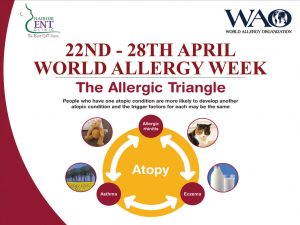
Allergic reactions occur when the body over reacts to harmless molecules. The most common respiratory allergy is allergic rhinitis. Allergic rhinitis causes a variety of annoying symptoms, including sneezing, itching, nasal congestion, runny nose, and post-nasal drip (the sensation that mucus is draining from the sinuses down the back of the throat). It may also manifest as an ear itch or palatal click (itchiness of the roof of the mouth).
Although not life threatening, allergic rhinitis has a negative effect on quality of life, sleep, work productivity and school performance.
Allergic rhinitis, also known as hay fever, affects approximately 16% of people of all ages. The risk of developing allergic rhinitis is much higher in people with asthma or eczema and in people who have a family history of asthma or eczema.
Allergic rhinitis can begin at any age, although most people first develop symptoms in childhood or young adulthood. The symptoms are often at their worst in children and in people in their 30s and 40s. However, the severity of symptoms tends to vary throughout life; many people experience periods when they have no symptoms at all.
Allergic rhinitis is caused by a nasal reaction to small airborne particles called allergens (substances that provoke an allergic reaction). In some people, these particles also cause reactions in the lungs (asthma) and eyes (allergic conjunctivitis).
Allergic rhinitis can be intermittent or persistent. Intermittent allergens include pollens from trees, grasses, and weeds, as well as spores from fungi and molds. Persistent allergens are dust mites, cockroaches, animal dander, and fungi or molds. Perennial allergic rhinitis tends to be more difficult to treat.
The symptoms of allergic rhinitis vary from person to person. Although the term “rhinitis” refers only to the nasal symptoms, many patients also experience problems with their eyes, throat, and ears. In addition, sleep can be disrupted, so it is helpful to consider the entire spectrum of symptoms.
- Nose: watery nasal discharge, blocked nasal passages, sneezing, nasal itching, post-nasal drip, loss of taste, facial pressure or pain.
- Eyes: itchy, red eyes, feeling of grittiness in the eyes, swelling and blueness of the skin below the eyes (called allergic shiners).
- Throat and ears: sore throat, hoarse voice, congestion or popping of the ears, itching of the throat or ears.
- Sleep: mouth breathing, frequent awakening, daytime fatigue, difficulty performing work.
When an allergen is present year round, the predominant symptoms include post-nasal drip, persistent nasal congestion, and poor-quality sleep.
Diagnosis is largely based on clinical symptoms and physical examination.
Identifying the allergen and possible triggers is possible.
- Recall the factors that precede symptoms
- Note the time at which symptoms begin
- Identify potential allergens in a person’s home, work, and school environments
Medical test may be ordered to confirm the diagnosis.
Skin prick tests are complimentary and utilized if the allergen is unknown.
A multifaceted approach including control measures like avoidance of exposure and triggers as well as medication is used. Single measures are commonly ineffective to control the symptoms in most people.
- Nasal rinses – Rinsing out the nose with salt water cleans the inside of the nose and gets rid of pollen in the nose. Different devices can be used to rinse the nose.
- Steroid nasal sprays – Doctors often prescribe these sprays first, but it can take days to weeks before they work. (Steroid nasal sprays do not contain the same steroids that athletes take to build muscle.)
- Antihistamines – These medicines help stop itching, sneezing, and runny nose symptoms. Some antihistamines can make people feel tired.
- Decongestants – These medicines can reduce stuffy nose symptoms. People with certain health problems, such as high blood pressure, should not take decongestants. Also, people should not use decongestant nasal sprays for more than 3 days in a row. Using these nose sprays for more than 3 days in a row can make symptoms worse.
- Allergy shots (immunotherapy)– Some people with seasonal allergies choose to get allergy shots. Usually, allergy shots are given every week or month by an allergy doctor. Many people find that this treatment reduces their symptoms, but it can take months or years to work.
- Leukotriene modifiers-these are new and generally reserved for patients who can’t withstand nasal steroid sprays or antihistamines.
The right treatment for you will depend a lot on your symptoms and other health problems. Combination of medication is often used to provide for optimal relief especially in severe symptoms.
If you want to get pregnant, talk with your doctor about which medicines are safe for pregnant women to take. Persistent allergy symptoms can get worse, get better, or stay the same in pregnant women.
Disclaimer
The content on the Nairobi ENT website is not intended nor recommended as a substitute for medical advice, diagnosis, or treatment. Always seek the advice of your own physician or other qualified health care professional regarding any medical questions or conditions.
Read More (a.)…
Read More (b.)…
Read More (c.)…

